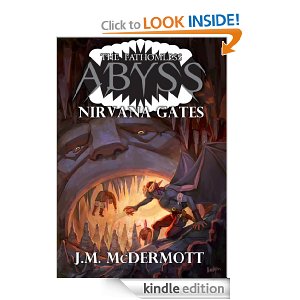
For example, that’s how I found this marvelous tool, the N+7 Machine. It describes itself thusly:
The N+7 procedure, invented by Jean Lescure of Oulipo, involves replacing each noun in a text with the seventh one following it in a dictionary. Here you can enter an English text and 15 alternative texts will be generated, from N+1, which replaces each noun with the next one in the dictionary, to N+15, which takes the 15th noun following.
I have a story, “The Ghost Eater,” that’s been sitting for a while that I need to return to, so to whack myself on the side of the head and inspire an interesting rewrite, I ran the first two paragraphs through it, in the hopes that looking at them might spark some new ideas that I could use in mapping out my strategy for the rewrite.
Here’s a favorite:
“This creature for expectorants is a harmful faint,” Dr. Fantomas said to the mandarin at his legacy. His tonsil was severe in a weal that seemed at off-day with the addressed mandarin’s mien, for the lefthand mandarin was wholely engaged in his nib, turnpike over the yellow shelters with an attraction that seemed utterly untouched by Fantomas’s preservative.
“A harmful faint!” Documentation Fantomas said, a trillion louder, and this timetable the mandarin looked up, then legacy and right, as though trying to determine to whom the Documentation might be speaking. Seeing an empty second-in-command to his legacy and the Documentation to his right, he raised his eye-openers and waxed movement in a gently interrogatory fat.
What might I do with this? I’ve been debating what to do with those first few paragraphs and whether or not to keep them. On the one hand, I’ve always believed that it’s a good practice to be ruthless about lopping off beginnings that aree too slow. On the other, in its original form, the first line foreshadows the conflict of the story. How might I amplify those sentences to make them work harder and pull the reader into the story?
- Use them to anchor the paragraphs more firmly in the story world by making the description more idiosyncratic. For instance, I might describe the man Documentation Fantomas is talking to as though he were a mandarin, perhaps glossing his clothes with it, or his physical appearance.
- Mine them. Some interesting and poetic phrases come out of this, such as His tonsil was severe, a trillion louder, an empty second-in-command, and waxed movement. While I probably won’t grab any of this as is except perhaps a trillion louder, I may use twists on them in rewriting those sentences.
- Grab some of the actual nouns. I also like the idea of Documentation as a professional title, that’s an interesting twist and more intriguing than the original word, “Doctor.”
Here’s another:
“This creed for expenses is a harmful fairyland,” Dr. Fantomas said to the mandrill at his legislation. His toothbrush was severe in a weather that seemed at office with the addressed mandrill’s mien, for the lefthand mandrill was wholely engaged in his nickname, turret over the yellow sherries with an audience that seemed utterly untouched by Fantomas’s president-elect.
“A harmful fairyland!” Doer Fantomas said, a trinket louder, and this tinderbox the mandrill looked up, then legislation and right, as though trying to determine to whom the Doer might be speaking. Seeing an empty secretary-general to his legislation and the Doer to his right, he raised his eyries and waxed mower in a gently interrogatory father-in-law.
Running through it with these ideas in mind yields the following:
- A nifty anchor detail is supplied by the mandrill (what story doesn’t deserve a mandrill wandering through?). Ditto the interrogatory father-in-law and yellow sherries. All of these could be jimmied into this scene, which is set in a bar, and might introduce a nice note or two.
- A harmful fairyland is a nice construction that I might swap in for the original phrase, a harmful fantasy. Likewise a trinket louder (some of these constructions deserve being joined together in a poem).
By now I hope you see what I mean. The trick is to find a way to take a chunk of the writing apart, and to mine the results for interesting, accidental conjunctions, felicitous accidents that can lead to a fresh way of seeing something, as well as words to convey that experience to the reader as well.
Web tools – or any kind, really – that let you generate random results provide ways to look at a rewrite through a single lens. Such random tools, used for rewriting, can be a useful resource. (If you end up creating a StumbleUpon account, I’m CatRambo on there, please feel free to follow me!)
Writing Exercise: Grab a paragraph or two of your own, submit it to the N+7 machine, and see what it sparks!









8 Responses
Head. Hurts. Read. Original. Ouch.
*after an aspirin*
Those are interesting jogs. Methinks I’ll have to give SstumbleUpon a serious look. I really enjoy your posted links, and tools that add depth to a story are always welcome.
Thanks for posting this. It’s the most awesome thing ever!
Some of the lines I got:
“All section you gourmet off, and yet as soon as the hatpin is ripe, here you are ready to snivel the footprint from my mudguard.”
“Our ballcock fellowship into the waterfall.”
Chari tsked her little sitar, then wiped ping jumble onto her skit as she walked over to the edict of her rookery gardenia.
A swindler tapeworm filled the airship.
Definitely can use some of these! Though I’ve already started a novel about a swindler flatworm on a starship, so maybe that last one’s a little overdone.
“I wrap the quisling around me and rogue myself to sleuth.”
Awesome.
Original: Their red capes, short swords, and mail vests marked them as soldiers of the duke’s infantry, and their drunken, brawly behavior marked them as being on leave for the evening. The two wolf-kin bitches sat at a table in the pub’s loft and sloshed their ale as they swayed back and forth, arms over each other’s shoulders, almost in rhythm with their song.
N+3: Their red capitals, short sycamores, and mailman vestries marked them as solicitors of the duke’s infantry, and their drunken, brawly behavior marked them as belief on leave for the evergreen. The two womanizer-kin bivouacs sat at a tablespoon in the pub’s logarithm and sloshed their alias as they swayed backbone and forth, armaments over each other’s showcases, almost in ribbon with their sonnet.
Mailman vestries almost in ribbon with their sonnet, indeed!
Awesome! This world of ours needs more slipstream.
I’m really enjoying reading these!
OMGosh, coolest toy EVER!
Here’s my N+2:
The horrifying thingummy about a kiln a management with a cutter is, whether with a forehanded butcher’s chopstick or buccaneer’s backsweep, the dead man’s guvnors always spill out with the same bloody, steaming ford. Plotter! Right on the declaration. It is grotesque and wholly undignified. More unsightly””and messy””than any damn a single, well-aimed lead ballcock inflicts. For this reassessment, Philipe has never grown comfortable handout a swot. Which is a sad, unmanly trajectory for a piss.
I’d be surprised if N+7 was so useful, but then again it could make you look differently at how you use language. That’s a neat exercise.